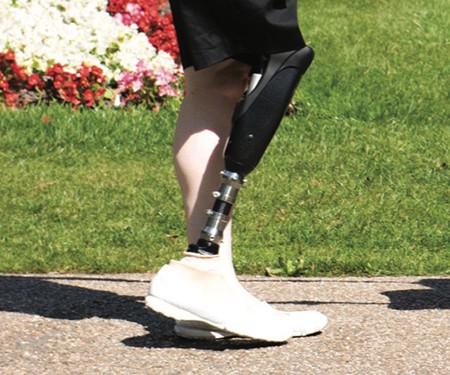The potentially huge benefits of the new NHS’ funding for advanced prosthetics

NHS England recently announced that it is making 10 more treatments freely available to patients that were previously only accessible to those on private healthcare. While much attention has been paid to the availability of pre-exposure prophylaxis to combat HIV transmission, the others also offer huge benefits to patients and potential future savings for the NHS. One such treatment is microprocessor-controlled prosthetic knees.
These next generation intelligent joints will now be opened up to patients on the Health Service, meeting specific criteria, giving Prosthetists the opportunity to prescribe amputees with the best solutions the market has to offer. Microprocessor-controlled prosthetic knees differ from traditional prosthetic models as they are designed with a battery-powered, built-in, programmable computer that continuously controls both the swing and stance phase of the user’s walk based on real time data.
Access to these microprocessor-controlled knees will be hugely beneficial to those suffering from above knee and hip disarticulation amputations, particularly K3 walkers who face issues with injury and weight distribution when using prostheses. Using current systems available on the NHS, amputees may often struggle to stand still as their knees have limited stability. The lack of trust in their prosthetic limb often means that the user will shift their weight onto the none-amputated limb. This has a detrimental effect on other joints. Users of microprocessor-controlled knees also benefit from stability on different terrains, slopes and steps, as well as being able to walk more naturally and efficiently at either single or varying speeds.
Joints such as Blatchford’s Orion 3 adapt hydraulic resistance in real time, providing the wearer with support when moving in any environment or 
If patients wearing microprocessor-controlled limbs are less likely to injure themselves thanks to the advanced technology, this has the potential to reduce costs and waiting times at clinics. If fewer amputees have to visit GPs or hospital wards due to prosthetic issues or injuries, NHS time and money can be spent on other areas.
As well as this, the decision to make microprocessor knees readily available to NHS patients will act as a catalyst to accelerate the development of even more advanced technologies to improve patients’ lives further. Previously, the technology was only accessible to a small market, hindering developer’s potential to grow and expand. Now that the treatment will be available on the Health Service, the amount of people who require these devices has suddenly become far broader. This will provide a much larger user group who can shape the future of the devices. This user input is crucial for Blatchford – we work closely with users to ensure that each solution is attuned to their personal needs, and gather their feedback to develop updates for the benefit of future users.
To ensure developers of prosthetics stand out to the NHS as a natural choice, companies will need to make sure that the product on offer provides users with the best functionality possible, whilst also proving to be the best value for money. This battle within the prosthesis market is only going to increase the pace of development of these limbs, helping create better devices that will benefit all in the future. There are already some highly advanced prosthetics available, and the industry will continue to search for ways to create even more advanced microprocessor-controlled knees in the future.
It’s refreshing to see that UK residents will now have access to best-in-class technology that is already widely available in other countries. In a world where technology continues to improve the lives of patients, it is a positive step to see NHS England harnessing what the market has to offer to benefit amputees, as well as investing in preventative measures to reduce the need for future treatments. This is a positive step forward for patients, the Health Service and the industry alike, and stands to only get better as the technology develops and becomes more accessible.
To find out more about Blatchford, visit the website HERE

